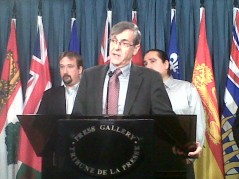Wow. What a way to kick off the first day of UN climate negotiations (sarcasm intended). Here’s a rundown of a number of emerging stories and some work we’ve been engaged in.
Canada to leave the Kyoto Protocol?
CTV reported recently that the Canadian government will announce later in December its intention to withdraw from the Kyoto Protocol. While Kent refused to directly respond when questioned at a press conference this morning, he has said that Kyoto is “in the past” and that Canada will not sign a second commitment period in Durban — a key demand of many developing countries. You can read the Council of Canadians response here. Two important points to emphasize on this. This is not about, as Kent suggests, getting all polluters under one banner. This is about moving to climate deal with even more loopholes including voluntary “pledges” for emission reductions, to allow business as usual in Canada — more emissions. Also, while fingers are often pointed at the emissions of so-called emerging countries such China and India, recent analysis by the Stockholm Environment Institute finds that the emission reductions of China, India, South Africa and Brazil could be slightly greater than the combined efforts of the 7 biggest developed countries –- the U.S., Europe, Japan, Canada, Australia, New Zealand and Russia by 2020.
Have your say in this CBC poll on whether the Kyoto Protocol is “in the past”
Canadian civil society groups decry government inaction on climate change
The Council of Canadians helped to co-ordinate an open statement denouncing Canadian government inaction on climate change endorsed by organizations and unions representing over 1 million Canadians. You can read the full statement which includes 5 key examples of Canadian government inaction and attempts to undermine climate policy here. The statement reads:
“The next major round of UN climate negotiations is November 28 to December 9, in Durban South Africa. Consistent with this pattern, Canada has a track record of acting more in the interests of big oil companies than Canadians at UN climate negotiations. The world needs an ambitious, equitable and binding international agreement on climate change. If Canada refuses to lead or follow in this pursuit, we should at least get out of the way.“
You can read a press release in English and French that accompany this statement. A press conference was also held this morning featuring Graham Saul, Executive Director, CAN Canada, Clayton Thomas Muller, Tar Sands Campaigner of the Indigenous Environmental Network, Garry Neil, Executive Director, the Council of Canadians, Roxanne Dubois, National Chairperson, Canadian Federation of Students and John Gordon, National President, PSAC. Each panellist spoke to different areas where the Canadian government has failed to take action or is causing problems in forward progress including ongoing 1.4 billion in subsidies to oil and gas, failing to federally regulate greenhouse gas emissions, cuts to Environment Canada and a key renewable energy program, being the only country to walk away from the Copenhagen talks and actually worsen our emission reduction targets and lobbying against clean fuel policies in the U.S. and EU.

Coverage so far includes a good Globe of Mail article featuring quotes from Graham, Garry and Clayton and a piece in the Canadian Press — “What this government wants to do is to negotiate voluntary commitments that will be completely ineffective,” said Gary Neil of the Council of Canadians.”So Kent is simply saying that he wants to continue down that path. Is this a surprise? No, of course, it’s not a surprise. But I think Canada’s position is finally revealed for the sham that it is, not only here in Canada but internationally.”
Youth unveil Canadian corporate negotiator uniforms in Durban
In a creative action, the Canadian Youth Delegation launched the latest fashion line in Durban for oily climate negotiators, BituMenswear. The BituMenswear suit jackets are adorned with logos from oil companies heavily invested in the tar sands, illustrating the industry’s sponsorship of Canadian climate policy and international negotiating strategy.
As described in their press releasee, “Oil and gas companies have a huge hand in creating and influencing Canadian climate policy, domestically and internationally. This year Canada has lobbied to weaken European fuel standards so that oil corporations can expand tar sands exports, increasing extraction of one the most carbon intense fuels in the world. The Keystone pipeline, which would carry bitumen from Alberta to Texas, was pushed through by our government despite public outcry and huge environmental consequences, until construction was delayed south of the border. Just yesterday, Environment Minister Peter Kent announced that he would be promoting the tar sands industry in Durban and sources indicate Canada will be officially backing out of the Kyoto protocol before the end of the commitment period. Through these policy decisions, Canada is condemning the world and all its peoples to irreversible climate change, violating countless human rights and degrading our international reputation along the way.”
Check out the CYD action photo gallery.
Canada takes home first and second place in today’s Fossil Awards
The third-place award went to the U.K. for today’s reports that they have done a deal with the Canadian government to support the entry of tar sands into the European fuel supply chain. The second place was awarded to Canada following statements by their environment minister that they are coming to Durban to “play hardball” with developing countries.
And Canada won first place for our clear refusal to sign a second commitment period under the Kyoto Protocol (a great approach for negotiations) and reports that Canada intends to legally leave the agreement next month.
Andrea Harden-Donahue is the Energy and Climate Justice Campaigner for The Council of Canadians. http://canadians.org



